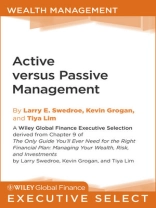The active versus passive debate is a contentious issue. Filled
with concrete evidence and comprehensive money management
strategies, this chapter from The Only Guide You’ll Ever Need for
the Right Financial Plan delves into the case for passive investing
over active investing. You can do so by investing in passively
managed investment vehicles like index funds and passive asset
class funds. You are virtually guaranteed to outperform the
majority of both professionals and individual investors. Written
for savvy investors and advisors, this chapter helps you:
* Integrate a passive investing strategy
* Maintain your portfolio’s risk portfolio in a tax-efficient
manner
* Determine the difference between the theories of efficient
versus inefficient markets
* Make cost-effective investment decisions
From Larry Swedroe, the author of the bestselling series of 'The
Only Guide’ investment books, with Kevin Grogan and Tiya Lim, this
chapter helps you integrate diversification, low turnover, and
asset allocation into one plan that meets the needs of a unique
situation.
Spis treści
Preface.
Acknowledgments.
PART I: INVESTMENT POLICY IN AN UNCERTAIN WORLD.
Chapter 1 The Uncertainty of Investing.
Efficient Frontier Models.
Chapter 2 The Investment Policy Statement.
The Foundation of the Investment Plan.
PART II: ASSET ALLOCATION.
Chapter 3 Asset Allocation.
The Ability, Willingness, and Need to Take Risk.
When Conflicts Arise.
Risk Factors.
Chapter 4 Equities.
Equities versus Fixed Income.
U.S. Equity versus International Equity.
Emerging Markets.
Value versus Growth.
Real Estate.
Your Home.
Collateralized Commodity Futures (CCF).
Socially Responsible Investing (SRI).
Chapter 5 Fixed Income.
Credit Quality.
Short-Term versus Long-Term Maturities.
Municipal Bonds.
Inflation-Protected Securities.
Short-Term Fixed Income versus TIPS.
Chapter 6 Alternative Investments.
Convertible Bonds: Not Recommended.
Covered Calls: Not Recommended.
Fixed-Income Currency Exposure: Generally Not Recommended.
EE Bonds: Recommended.
Emerging Market Bonds: Not Recommended.
Equity-Indexed Annuities (EIAs): Not Recommended.
Gold: Not Recommended.
Hedge Funds: Not Recommended.
High-Yield (Junk) Bonds: Not Recommended.
Leveraged Buyouts (LBOs): Not Recommended.
Leveraged Funds: Not Recommended.
Master Limited Partnerships (MLPs): Not Recommended.
Mortgage-Backed Securities (MBS): Not Recommended.
Precious Metals Equities (PME): Not Recommended.
Preferred Stocks: Not Recommended.
Private Equity (Venture Capital): Not Recommended.
Stable-Value Funds: Generally Not Recommended.
Structured Investment Products: Not Recommended.
Variable Annuities: Not Recommended.
Chapter 7 Liabilities and Asset Allocation.
Mortgages.
Prepay the Mortgage or Increase Tax-Advantaged Savings?
Other Liabilities.
PART III: IMPLEMETNING THE PLAN.
Chapter 8 Individual Securities or Mutual Funds.
Convenience.
Diversification.
Size Matters.
Advantages of Individual Securities.
Separate Account Managers.
A Word of Caution.
Summary.
Chapter 9 Active versus Passive Management.
The Evidence.
The Search for the Holy Grail: Why Is Persistent Outperformance so Hard to Find?
The Value of Economic Forecasts.
The Value of Security Analysis.
Buy, Sell, or Hold?
The Tyrannical Nature of an Efficient Market.
The Prudent Investor Rule.
The Benefits of Passive Investing.
Summary.
Chapter 10 The Asset Location Decision.
Exceptions.
Order of Preference.
Additional Considerations.
Advanced Concept.
Balanced and Lifestyle Funds.
Chapter 11 The Care and Maintenance of a Portfolio.
Rebalancing.
Tax Management Strategies.
Final Considerations.
PART IV: THE INVESTMENT PLAN AND FINANCIAL SECURITY.
Chapter 12 College Savings Plans.
529 Plans.
Coverdell Education Savings Accounts.
Custodial Accounts.
U.S Savings Bonds.
Financial Aid Impact.
Chapter 13 Insurance.
Risk Management.
Payout Annuities.
Long-Term Care Insurance (LTCI).
Life Settlements.
Chapter 14 IRAs and Retirement/Profit Sharing Plans.
Roth versus Traditional IRA.
Five key Facts.
What to Do When Retirement Plan Choices Are Poor.
IRA Conversions.
Chapter 15 Social Security.
Is Social Security a Balance Sheet Asset?
Double Dipping Strategy.
Chapter 16 Determining a Safe Withdrawal Rate.
Monte Carlo (MC) Simulations.
In Absence of an MC Simulator.
The Sequence of Withdrawals to Fund Retirement.
Chapter 17 Planning Beyond Your Lifetime.
Estate Planning.
Preparing Your Heirs.
Conclusion.
Appendix A Effective Diversification in a Three-Factor World.
Appendix B Dollar Cost Averaging.
Appendix C Reverse Mortgages.
Appendix D How to Choose an Adviser You Can Trust.
Notes.
Glossary.
Index.
O autorze
LARRY E. SWEDROE is Principal and Director of Research for
The Buckingham Family of Financial Services, which includes
Buckingham Asset Management and BAM Advisor Services. Buckingham
Asset Management manages more than $2 billion in assets for
individuals, businesses, trusts, not-for-profits, and retirement
plans. BAM Advisor Services provides turnkey asset management
services for more than 120 registered investment advisor firms and
manages or administers more than $9 billion in assets. Swedroe has
held executive level positions at Prudential Home Mortgage,
Citicorp, and CBS. He frequently speaks at financial conferences
throughout the year and writes the blog 'Wise
Investing’ for CBS Money Watch.com.
KEVIN GROGAN is an Investment Advisor Associate for The
Buckingham Family of Financial Services.
TIYA LIM is an Investment Strategy Manager for The
Buckingham Family of Financial Services.












